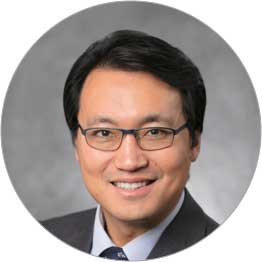
George Zhi Cheng, MD, PhD, FCCP

George Zhi Cheng, MD, PhD, FCCP
When thousands of pulmonary and critical care clinicians gather in Chicago from October 19 to 22 for CHEST 2025, advances and new technologies in the diagnosis and treatment of lung cancer will be among the most in-demand sessions.
George Zhi Cheng, MD, PhD, FCCP, CHEST 2025 Lung Cancer/Interventional Pulmonary/Radiology Curriculum Group Lead, was a key driver in ensuring that the educational program has broad appeal across the entire career spectrum, from early career to mid-career to advanced career professionals.
Sessions ranging from interventional pulmonology and procedures to new advances in research and minimally invasive bronchoscopic treatment will be of great interest to attendees.
“CHEST is offering a variety of sessions this year that target and satisfy educational needs for all the individuals who are involved in the spectrum of care delivery for patients with lung cancer,” Dr. Cheng said. “We have sessions that cover topics from lung cancer screening to treatment and management. We have sessions that will be of interest to surgeons, and we have sessions that will be of interest to public health specialists because they’re focused on equitable access to effective lung cancer screening.”
Sessions sharing information about new technological breakthroughs and promising research on early detection are always among the most popular at the CHEST Annual Meeting, and the 2025 gathering in Chicago will be no different. Dr. Cheng said “major names” and global experts from Australia and the United Kingdom will be among the speakers, with more specific details to come.
As an interventional pulmonology specialist, Dr. Cheng admitted he’s partial to sessions in his specific area of expertise, like sublobar resection vs lobar resection, but he’s also looking forward to the more laboratory-based information.
“Biomarkers are an exciting component in all aspects of pulmonary disease, specifically within the thoracic oncology and chest procedures area,” Dr. Cheng said. “We have sessions on biomarkers in early detection of lung cancer, and, also, cancer risk stratification is an area I think has a lot of potential. Obviously, there will also be some interesting debates. So, stay tuned.”
The appeal of attending CHEST 2025 includes the networking opportunities and collaboration, but the broad curriculum providing fascinating and informative learning opportunities to chest medicine professionals—whether they’re in the early stages of their career or seasoned veterans—is a particular point of pride for the faculty responsible for creating the program, like Dr. Cheng.
“All of our sessions have topics that will be applicable enough to interest people who are in their mid-career to late career,” Dr. Cheng said. “There are specific areas that are relatively new, so they may have a little bit more slant on the research side or investigative side. But the majority of our sessions are going to be very practical in terms of day-to-day clinical operation for clinicians who are coming to the conference.”
READ ALL CHEST 2025 BLOGS »